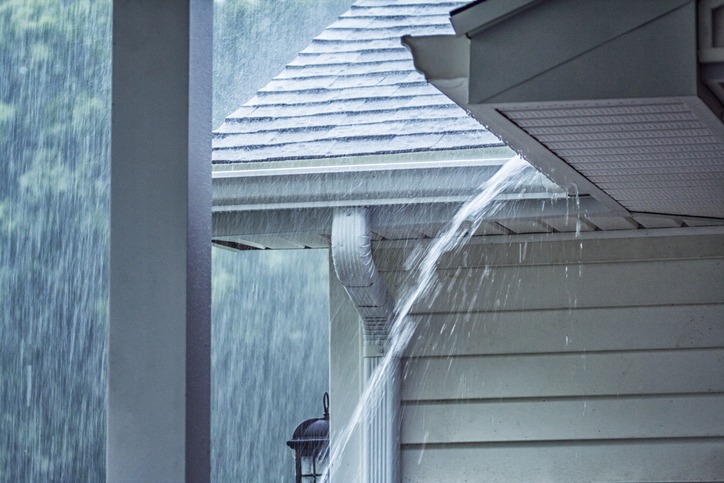Rainwater can pose various challenges for a home’s plumbing system, leading to potential issues that require attention and maintenance. Understanding the common plumbing problems that can arise from rain can help homeowners take proactive measures to prevent damage and ensure the smooth operation of their plumbing, such as ensuring thorough drain cleaning before rain weather becomes more frequent.
Learn all about some of the most common plumbing problems that can occur due to rain and how you can properly address them.
1. Clogged Gutters and Downspouts
One of the primary issues caused by rain is the accumulation of debris in gutters and downspouts. When leaves, twigs, and other debris collect in the gutters, they can obstruct the flow of rainwater, causing it to overflow or back up. This can lead to water damage to the roof, walls, and foundation of the house. To address this problem, regularly inspect and clean your gutters and downspouts. Remove any debris that has accumulated and ensure that water can flow freely through the system. Consider installing gutter guards to prevent debris from entering the gutters in the first place.
2. Basement Flooding
Heavy rainstorms can lead to basement flooding, which can be a major headache for homeowners. Excess rainwater can seep into basements through cracks in the foundation, poorly sealed windows or doors, or overwhelmed drainage systems. To prevent basement flooding, ensure that your basement is properly waterproofed. Seal any cracks or gaps in the foundation, install window well covers, and consider installing a sump pump to help remove excess water from the basement. Additionally, ensure that your yard’s grading directs water away from the foundation to prevent water from pooling around the house.
3. Sewer Line Backups
During periods of heavy rainfall, the sewer system can become overwhelmed, leading to backups and blockages in the sewer line. This can result in toilets, sinks, and drains backing up, causing unpleasant odours and potential health hazards. To prevent sewer line backups, avoid flushing inappropriate items down the toilet or pouring grease down the drains. Consider installing a backwater valve, which helps prevent sewage from flowing back into your home during heavy rainfall. Regularly maintain your sewer lines by scheduling professional inspections and cleaning as necessary.
4. Leaking Roof
Rain can reveal pre-existing issues with your roof, such as damaged or missing shingles, deteriorated flashing, or leaks around chimneys and vents. These problems can result in a leaky roof and water entering your home, causing water damage and compromising the integrity of your roof. Regularly inspect your roof for any signs of damage and address issues promptly. Replace missing or damaged shingles, repair flashing, and seal any leaks to prevent water from entering your home.
5. Overflowing Storm Drains
Storm drains are designed to collect and channel rainwater away from streets and properties. However, if storm drains become clogged with debris or overwhelmed by excessive rainfall, they can overflow, causing water to accumulate on roads and properties. This can result in water pooling around your home’s foundation or flooding your yard. Keep an eye on storm drains near your property and report any issues to the appropriate authorities. Regularly clear debris from storm drains to ensure proper functioning, take time for drain cleaning and prevent water accumulation when necessary.
6. Pipe Leaks and Burst Pipes
Excessive rain can cause the ground to become saturated, exerting pressure on underground pipes. This pressure can lead to leaks or even burst pipes, resulting in water damage and the need for immediate repairs. Insulate exposed pipes to protect them from extreme temperature changes and consider installing pressure relief valves to prevent excessive pressure buildup. If you notice any signs of water leaks, such as damp spots, water stains, or reduced water pressure, contact a professional plumber to inspect and repair the issue.
7. Water Heater Malfunctions
Fluctuations in temperature and excessive rain can impact the performance of your water heater. Rainwater can enter the combustion chamber of a gas water heater or affect the electrical components of an electric water heater, leading to malfunctions. It is essential to ensure that your water heater is properly maintained and protected from the elements. Regularly inspect and service your water heater, and consider installing a water heater blanket to provide insulation and protect it from temperature variations.
Conclusion
Rain can result in various plumbing problems that require attention and maintenance. From clogged gutters and downspouts to basement flooding, sewer line backups, leaking roofs, overflowing storm drains, pipe leaks, and water heater malfunctions, homeowners should be aware of these issues and take preventive measures. Regular maintenance, prompt repairs, and installing appropriate safeguards can help mitigate the impact of rain on your home’s plumbing system, ensuring its efficient operation and protecting your property from water damage.
